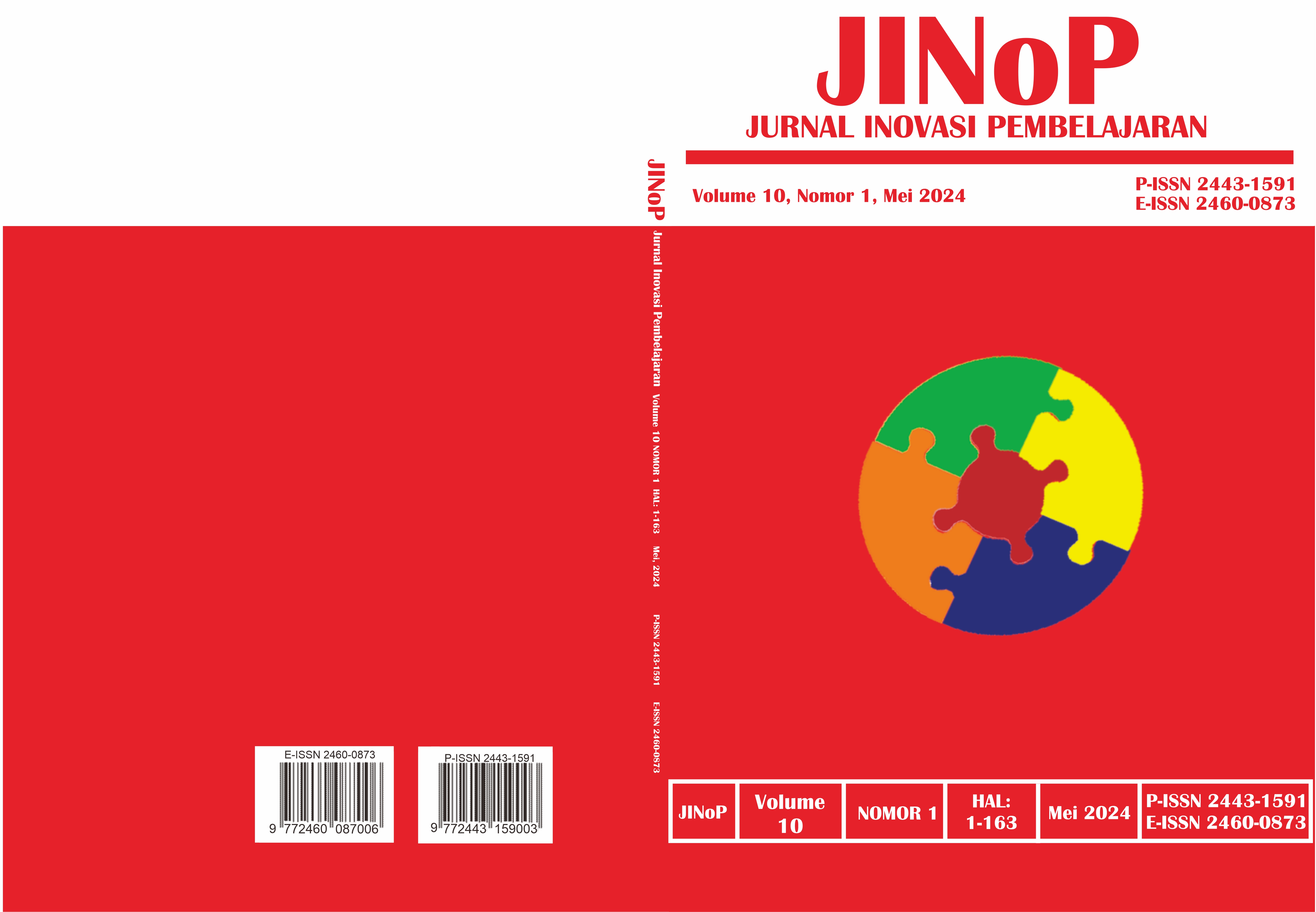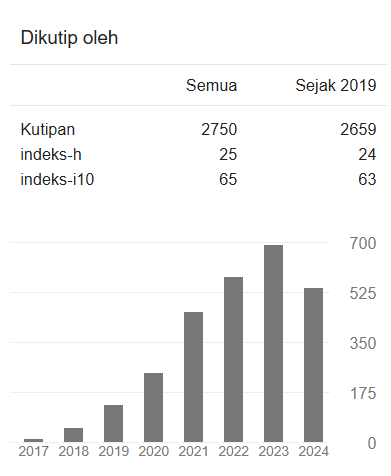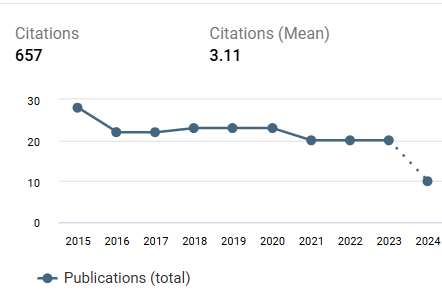Utilizing GeoGebra-assisted model-eliciting activities (MEAs) in mathematics instruction enhances students' comprehension of concepts and improves their problem-solving abilities
DOI:
https://doi.org/10.22219/jinop.v10i1.25819Keywords:
Geogebra, Mathematics Concept Understanding, Model Eliciting Activities (MEAs), Problem Solving AbilityAbstract
A key goal of teaching math is for students to develop a deep understanding of concepts. This understanding is the foundation for all future learning in math. The purpose of this study was to improve students' conceptual understanding and problem-solving skills in GeoGebra-assisted mathematics learning with Model Eliciting Activities (MEAs). The quantitative method with a nonequivalent (pre-test and post-test) group design was used to answer the hypothesis. The instruments used were pre-test and post-test in the form of descriptions consisting of 5 questions. The participants in this study were 26 junior high school students. Data analysis used Paired Sample T-tests (t-test) to determine the level of conceptual understanding and problem-solving ability of students. The results of data analysis obtained that the application of Model Eliciting Activities (MEAs) assisted by GeoGebra is effective in increasing student’ understanding of mathematical concepts and student problem-solving skills. So, it is concluded that learning with the Eliciting Activities Model (MEAs) assisted by GeoGebra can improve students' conceptual understanding and problem-solving skills. In the future teachers are recommended to use Model Eliciting Activities (MEAs) assisted by GeoGebra in learning mathematics.
Downloads
References
Adliani, S., Asmin, A., & Hasratuddin, H. (2020). The Influence of Realistic Mathematical Approach to Understanding Concept and the Mathematical Connection Ability of Islamic Private Vocational School Students Hikmatul Fadhillah Medan Class VII. Budapest International Research and Critics in Linguistics and Education (BirLE) Journal, 3(1), 487–499. https://doi.org/10.33258/birle.v3i1.844
Afhami, A. H. (2022). Aplikasi Geogebra Classic terhadap Pemahaman Konsep Matematika Siswa pada Materi Transformasi Geometri. Plusminus: Jurnal Pendidikan Matematika, 2(3), 449–460. https://doi.org/10.31980/plusminus.v2i3.1878
Aini, P. N., Hariyani, S., & Suwanti, V. (2020). Analisis Pemahaman Konsep Matematika Ditinjau Dari Gaya Belajar Siswa Menurut Teori Honey Mumfor. JP2M (Jurnal Pendidikan Dan Pembelajaran Matematika), 6(2), 44. https://doi.org/10.29100/jp2m.v6i2.1746
Anggraeni, E. R., Ma’rufi, M., & Suaedi, S. (2021). Pengembangan Media Pembelajaran Matematika Berbasis Geogebra Untuk Meningkatkan Kemampuan Pemahaman Konsep Siswa. Proximal: Jurnal Penelitian Matematika Dan Pendidikan Matematika, 4(1), 43–55. https://doi.org/10.30605/proximal.v4i1.503
Arbain, N., & Shukor, N. A. (2015). The Effects of GeoGebra on Students Achievement. Procedia - Social and Behavioral Sciences, 172, 208–214. https://doi.org/10.1016/j.sbspro.2015.01.356
Baye, M. G., Ayele, M. A., & Wondimuneh, T. E. (2021). Implementing GeoGebra integrated with multi-teaching approaches guided by the APOS theory to enhance students’ conceptual understanding of limit in Ethiopian Universities. Heliyon, 7(5). https://doi.org/10.1016/j.heliyon.2021.e07012
Budiman, H., & Syayyidah, K. N. (2018). Penerapan Pembelajaran Model Eliciting Activities (Meas) Untuk Meningkatkan Kemampuan Berpikir Kreatif Matematis Siswa. Delta: Jurnal Ilmiah Pendidikan Matematika, 6(1), 11. https://doi.org/10.31941/delta.v6i1.540
Christou, C., Pitta-Pantazi, D., & Chimoni, M. (2024). Teachers’ mathematical problem posing: The role of processes and complexity levels in posing problems on the fraction part-whole concept. Journal of Mathematical Behavior, 73. https://doi.org/10.1016/j.jmathb.2024.101134
Dewi, L. G. A. K., Hartawan, I. G. N. Y., & Astawa, I. W. P. (2019). Penerapan model eliciting activities (MEAs) berbantuan masalah open endeduntuk meningkatkan pemahaman konsep matematika siswa. Jurnal Pendidikan Dan Pembelajaran Matematika Indonesia, 8(2), 31–49. https://doi.org/10.23887/jppm.v8i2.2851
Farida, N. (2021). Pelatihan media geogebra untuk meningkatkan pemahaman konsep geometri pada siswa SMA. J-ADIMAS (Jurnal Pengabdian Kepada Masyarakat), 9, 11–18. https://doi.org/10.29100/j-adimas.v9i1.1937
Hirzi, R. H. (2015). Penerapan model pembelajaran kooperatif tipe snowball throwing pada pembelajaran segiempat untuk meningkatkan aktivitas dan prestasi belajar siswa smpn 1 lingsar kelas vii-1 tahun pelajaran 2012/2013. Jurnal Pijar Mipa, X(1), 37–40. https://doi.org/10.29303/jpm.v10i1.15
Illahi, K. (2019). Pengaruh pendekatan model eliciting activities (MEAs) terhadap kemampuan berpikir berpikir kritis dan disposisi matematis siswa. Jurnal Math Educator Nusantara, 5, 190–197. https://doi.org/10.29407/jmen.v5i2.12891
Jelatu, S. (2018). Pengaruh penggunaan media geogebra terhadap pemahaman konsep geometri ditinjau dari kemampuan spasial siswa Silfanus. Jurnal Pendidikan Dan Kebudayaan Missio, 10, 137–273. https://doi.org/10.36928/jpkm.v10i2.167
Jumadi, J. (2017). Penerapan pendekatan model-eliciting activities (meas) dalam meningkatkan kemampuan pemecahan masalah siswa kelas XII SMA N 2 YOGYAKARTA. Aksioma, 8(2), 43. https://doi.org/10.26877/aks.v8i2.1874
Junaidi. (2019). Penerapan pendekatan model eliciting activities (meas) dalam pembelajaran matematika untuk meningkatkan kemampuan berpikir kritis siswa SMP. Jurnal Sosial Humaniora Sigli, 2(2), 10–16. https://doi.org/10.47647/jsh.v2i2.167
Juniantari, M. (2019). Pengaruh Penerapan Model Eliciting Activities terhadap Prestasi Belajar Matematika Siswa Kelas VIII SMP. Journal of Education Technology, 3(1), 9. https://doi.org/10.23887/jet.v3i1.17958
Kastira, C., & Irwan. (2019). The Effect of Master Model To Students Understanding of Mathematical Concepts. Journal of Multidisciplinary Research of …, 2(1), 19–29.
Lee-wanson, H., Arizmendi, G. D., & Li, J. T. (2021). Working memory growth predicts mathematical problem-solving growth among emergent bilingual children. Journal of Experimental Child Psychology, 201. https://doi.org/10.1016/j.jecp.2020.104988
Mandailina, V., Al Musthafa, S., & Pramita, D. (2018). Kombinasi Media Delphi Dan Geogebra Dalam Pembelajaran Dimensi Tiga. Paedagoria | FKIP UMMat, 7(2), 65. https://doi.org/10.31764/paedagoria.v7i2.32
Maria, Fatima Mei. (2019). Penggunaan model elicting activities (MEAs) dalam meningkatkan hasil belajar ditinjau dari self confidence pada materi aritmatika. AKSIOMA: Jurnal Program Studi PendidikanMatematika, 11(3), 1768–1774. https://doi.org/10.24127/ajpm.v11i3.5436
Meisya, S., Suhandri, S., & Nufus, H. (2018). Pengembangan Lembar Kerja Siswa Berbasis Model-Eliciting Activities untuk Memfasilitasi Kemampuan Komunikasi Matematis Siswa Sekolah Menengah Pertama. JURING (Journal for Research in Mathematics Learning), 1(1), 33. https://doi.org/10.24014/juring.v1i1.5051
Mollakuqe, V., Rexhepi, S., & Iseni, E. (2020). Incorporating Geogebra into Teaching Circle Properties at High School Level and it’s Comparison with the Classical Method of Teaching. International Electronic Journal of Mathematics Education, 16(1), em0616. https://doi.org/10.29333/iejme/9283
Mukarramah, M., Edy, S., & Suryanti, S. (2022). Pengaruh Penggunaan Software Geogebra Terhadap Kemampuan Pemahaman Konsep dan Pemecahan Masalah matematika Peserta Didik SMP. JIPM (Jurnal Ilmiah Pendidikan Matematika), 11(1), 67. https://doi.org/10.25273/jipm.v11i1.13309
Muna, B., Rahayu, R., & Ulya, H. (2019). Penerapan Model Eliciting Activities Berbantuan Media APPEM Untuk Meningkat Kemampuan Pemahaman Konsep Pada Siswa SD. Jurnal Prakarsa Paedagogia, 2(1). https://doi.org/10.24176/jpp.v2i1.3902
Nam, P. S. (2022). GeoGebra As a Tool to Enhance Understanding of the Concept of Derivative of a Function and Develop Mathematical Competencies. VIETNAM JOURNAL OF EDUCATIONAL SCIENCES, 18(1). https://doi.org/10.15625/2615-8957/22210106
Novitasari, D., Hamdani, D., Arifin, S., & Junaidi. (2021). Pengembangan lkpd berbasis geogebra untuk meningkatkan pemahaman konsep matematika. Jurnal Edukasi Dan Sains Matematika, 7(1), 1–16. https://doi.org/10.25134/jes-mat.v7i1.3916
Nulhakim, A. L., Susanto, A., & Husain, A. (2022). Penggunaan Software Geogebra untuk Meningkatkan Kemampuan Pemahaman Konsep Bangun Ruang Matematis Siswa. Prosiding Seminar Nasional Sains, 3(1), 186–190
Nurani, M., Riyadi, R., & Subanti, S. (2021). Profil Pemahaman Konsep Matematika Ditinjau Dari Self Efficacy. AKSIOMA: Jurnal Program Studi Pendidikan Matematika, 10(1), 284. https://doi.org/10.24127/ajpm.v10i1.3388
Nuryadi, Tutut Dewi Astuti, Endang Sri Utami, M. B. (2017). Dasar-Dasar Statistik Penelitian. Sibuku Media.
Nusantari, L. P. T. L. (2016). Pengaruh model-eliciting activities (meas) terhadap kemampuan pemecahan masalah matematika siswa. Jurnal Pendidikan Matematika Undiksha, 7. https://doi.org/10.23887/jjpm.v3i1.5900
Osuna, J. M., & Munson, J. (2024). Exploring what teachers notice about students’ interactional dynamics during collaborative mathematics problem-solving and their connections to instructional practice. Teaching and Teacher Education, 137. https://doi.org/10.1016/j.tate.2023.104380
Sari, L. F. (2022). Pengaruh pendekatan pembelajaran matematika model elicaiting activities terhadap kemampuan pemahaman konsep. RELEVAN : JURNAL PENDIDIKAN MATEMATIKA, 2, 77–87. https://ejournal.yana.or.id/index.php/relevan/article/view/252
Savitri, M.D, Sudiarta, I. G. P., & Sariyasa, S. (2021). Pengaruh meas berbantuan geogebra terhadap kemampuan pemahaman konsep dan disposisi matematika siswa. JIPM (Jurnal Ilmiah Pendidikan Matematika), 10(2), 243. https://doi.org/10.25273/jipm.v10i2.9240
Setyani, N. A., & Suhendar, U. (2022). Analisis Keterkaitan Minat Belajar Dan Motivasi Belajar Dalam Proses Pemahaman Konsep Matematika. SEPREN: Journal of Mathematics Education and Applied, 04(01), 11–22. https://doi.org/10.36655/sepren.v4i1
Sulistyaningsih, A. (2017). Analisis kesalahan siswa menurut kastalon dalam pemecahan masalh matematika. Seminar Matematika Dan Pendidikan Matematika UNY. https://www.camcode.com.au/download/f1ee7_seminar-matematika-dan-pendidikan-matematika
Sumirattana, S., Makanong, A., & Thipkong, S. (2017). Using realistic mathematics education and the DAPIC problem-solving process to enhance secondary school students’ mathematical literacy. Kasetsart Journal of Social Sciences, 38(3), 307–315. https://doi.org/10.1016/j.kjss.2016.06.001
Hadi., & Kasum. (2015). Pemahaman konsep matematika siswa smp melalui penerapan model pembelajaran kooperatif tipe memeriksa berpasangan (pair checks). EDU-MAT Jurnal Pendidikan Matematika, Volume 3, Nomor 1, April 2015, Hlm 59 - 66 PEMAHAMAN, 3(April), 59–66. http://dx.doi.org/10.20527/edumat.v3i1.630
Thoyyibah, L., Azizah, D., & Karimah, S. (2018). Pengaruh MEAs Terhadap Kemampuan Pemecahan Masalah Dilihat Dari Kemandirian Belajar Siswa. Jurnal Pendidikan Surya Edukasi (JPSE), 4(April), 104–118. http://ejournal.umpwr.ac.id/index.php/surya/search/authors/view?firstName=Lailatuth&middleName=&lastName=Thoyyibah&affiliation=Universitas Pekalongan&country=ID
Vadya, D., Qothrunnada, N., Faradillah, A., Ajiz Awalludin, S., & Muhammadiyah Hamka, U. (2022). Analisis Kemampuan Pemahaman Konsep Siswa Sma Dalam Menyelesaikan Soal Matematika Berdasarkan Gender Dan Geogebra. Jurnal GeoGebra Indonesia, 2(1). http://journal.geogebra.id/index.php/IGJ/article/view/20
Wijayanti, P. S. (2013). Pengaruh Pendekatan MEAs terhadap Kemampuan Pemecahan Masalah, Komunikasi Matematis, dan Kepercayaan Diri Siswa. PYTHAGORAS: Jurnal Pendidikan Matematika, 8(2), 181–192. http://journal.uny.ac.id/index.php/pythagoras
Yanti, R., Laswadi, L., Ningsih, F., Putra, A., & Ulandari, N. (2019). Penerapan pendekatan saintifik berbantuan geogebra dalam upaya meningkatkan pemahaman konsep matematis siswa. AKSIOMA : Jurnal Matematika Dan Pendidikan Matematika, 10(2), 180–194. https://doi.org/10.26877/aks.v10i2.4399
Yulianty, N. (2019). Kemampuan Pemahaman Konsep Matematika Siswa Dengan Pendekatan Pembelajaran Matematika Realistik. Jurnal Pendidikan Matematika Raflesia, 4(1), 60–65. https://doi.org/10.33449/jpmr.v4i1.7530
Zulfitri, H. (2019). Analisis Kemampuan Pemecahan Masalah Matematika Setelah Pembelajaran dengan Pendekatan MEAs pada Materi Sistem Persamaan Linier Tiga Variabel. Jurnal Gantang, 4(1), 7–13. https://doi.org/10.31629/jg.v4i1.881
Downloads
Published
How to Cite
Issue
Section
License
Copyright (c) 2024 Febriani et al

This work is licensed under a Creative Commons Attribution 4.0 International License.
Copyright Notice
Authors who publish with JINoP (Jurnal Inoasi Pembelajaran) agree to the following terms:
- For all articles published in the JINoP (Jurnal Inovasi Pembelajaran), copyright is retained by the authors. Authors give permission to the publisher to announce the work with conditions. When the manuscript is accepted for publication, the authors agree to the automatic transfer of the publishing right to the publisher.
- Authors retain copyright and grant the journal the right of first publication with the work simultaneously licensed under a Creative Commons Attribution 4.0 International License. that allows others to share the work with an acknowledgment of the work's authorship and initial publication in this journal.
- Authors are able to enter into separate, additional contractual arrangements for the non-exclusive distribution of the journal's published version of the work (e.g., post it to an institutional repository or publish it in a book), with an acknowledgment of its initial publication in this journal.
- Authors are permitted and encouraged to post their work online (e.g., in institutional repositories or on their website) prior to and during the submission process, as it can lead to productive exchanges, as well as earlier and greater citation of published work (See The Effect of Open Access).








